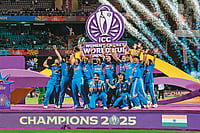Years before he became premier, years after he rallied wounded tigers into a World Cup-winning team, Imran Khan was watching his Pakistan play dismally at the 1999 WC in England from the commentary box. Writing in his memoirs, Alan Wilkins, Khan’s fellow commentator, describes how the fuming ex-captain clambered over the scaffolding, “moving like a cricketing Zorro over the pipes and railings onto the balcony of the Pakistan dressing room” to (loudly) give the team a talking to, his duties at the microphone be damned.
Wilkins might have been pronounced ‘emotional’ and benched in his county cricket days; as a commentator, nationalist emotion is hardly the accusation that can be directed at the Welshman. Forget climbing pipes, he wouldn’t even slip in a ‘we’ while calling a game.
He is not that kind of presenter; he is also not that kind of writer. Wilkins’s understated voice is both the greatest strength and weakness of Easier Said Than Done, his memoirs of a life playing, watching and talking about sport.
In India, in some gloriously mangled version of his last name, he is one of the best known faces on sports TV. However, given the rarity of ‘in our days’ reminiscing, few would know he played first-class cricket—with a credibility that earned him a decent record and bragging rights against the likes of Viv Richards, Gavaskar and Ian Botham.
He writes with warmth of those days of hope, success and despair, of unfathomable schedules and mad dashes across the country, of an ambition that earned him a truncated career and cost him two marriages, and his ambiguous morality of playing in apartheid South Africa. Almost more revealing than the personal story are the glimpses, often accidental and always informative, into an era when “planes had smoking sections”, mankading was Just Not Cricket, and counties overflowed with overseas greats—West Indian pace legends, Pakistani entertainers, Indian geniuses and pugilistic South Africans.
Most rewarding are those anecdotes that, in keeping with the Richie Benaudian philosophy of economy with words, end in unfussy, quotable quotes about the test of human wills that is sport: “doubting your ability is part of the challenge”; “we make selfish decisions because the journey we make is largely our own”; “I was learning quickly…there was no room for sentiment”.
Less satisfying is when this same distance is extended to discussing his commentary assignments. The linear timeline is shorn of drama, novelty and insight. When he’s denied the better gigs “because you’re not Indian and you didn’t play Test cricket”, the issue is wrapped up in a few paragraphs. The golden age of commentary may have long fallen silent, but this, as well as issues of gender equity, technology and jingoism are ones Wilkins is uniquely positioned to address, but misses an opportunity to do so.
Given everything we know and have heard of Wilkins, a behind-the-scenes expose of what happens once the cameras are tßurned off would perhaps be uncharacteristic. But then again, one wonders what could have been for that eager young man for whom the big criticism back then was that there was “too much emotion involved”.






















